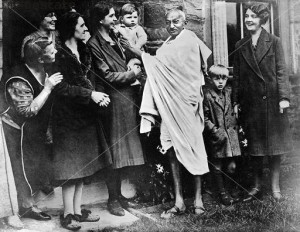 There is an intriguing thesis at the heart of Steven Pinker’s new book, The Better Angels of Our Nature. The Harvard psychologist argues – contrary to popular opinion – that humankind has become progressively less violent over the past few thousand years. We might feel surrounded by terrorism, civil wars and gun crime today, but murder and warfare is in fact on the decline. And the reason? One of Pinker’s key explanations is the rise of empathy as a force for social change: we are now more likely to look at the world through other people’s eyes, and consequently take action on their behalves.
There is an intriguing thesis at the heart of Steven Pinker’s new book, The Better Angels of Our Nature. The Harvard psychologist argues – contrary to popular opinion – that humankind has become progressively less violent over the past few thousand years. We might feel surrounded by terrorism, civil wars and gun crime today, but murder and warfare is in fact on the decline. And the reason? One of Pinker’s key explanations is the rise of empathy as a force for social change: we are now more likely to look at the world through other people’s eyes, and consequently take action on their behalves.
What I find missing in Pinker’s worthy tome – and books which make a similar argument, such as Jeremy Rifkin’s The Empathic Civilization – is a clear steer on how we can expand our capacity to empathise in everyday life. How exactly can we get better at it? And how can we integrate it into the way we approach the art of living? An answer lies not in the musings of psychologists or all those neuroscientists who have become obsessed with finding the empathic hotspots in our brains, but in the ideas of one of the great empathic adventurers of the twentieth century, Mahatma Gandhi.
His philosophy of empathy is embodied in what is known as ‘Gandhi’s talisman’:
I will give you a talisman. Recall the face of the poorest and weakest man whom you may have seen, and ask yourself if the step you contemplate is going to be of any use to him. Will he gain anything by it? Will it restore him to a control over his own life and destiny? Will it lead to swaraj [freedom] for the hungry and spiritually starving millions? Then you will find your doubts and yourself melting away.
The talisman contains a moral framework that each of us can choose to live by: to consider the perspective of the most marginal members of society when making decisions on ethical issues, and to ensure they benefit in some way. Gandhi challenges us to imagine ourselves into the lives of people whose everyday existence might be vastly different from our own. Beyond this, the talisman is a guide to confronting our existential difficulties. When we feel paralysed by doubt or entangled in personal problems to the extent that we don’t know what to do, we can find liberation and direction through an act of empathic imagining. The talisman may provide clarity in our state of confusion or indecision.
Gandhi lived out his empathic ideals. He worked as a nurse in South Africa as a young man: during the Zulu rebellion in Natal, he nursed Zulus who had been flogged and left by the British, whose regular nurses refused to attend them. His experiments living on ashrams were also an exercise in stepping into other people’s shoes. ‘Our ambition was to live the life of the poorest people,’ he said. That’s why he tended goats and cleaned toilets, alongside leading the resistance against British rule in India.
But his real originality was to stress the importance of empathising with one’s enemies. During the growing conflict between Hindus and Muslims in the years leading up to independence in 1947, he declared, ‘I am a Muslim! And a Hindu, and a Christian and a Jew’.
The half million deaths that occurred during partition in violence between Hindus and Muslims showed that the moral challenge of empathising with one’s adversaries was too great in that turbulent moment in history. But I still think we can learn from Gandhi’s approach. Trying to look through the eyes of those whose views we don’t agree with – whether it is a nasty boss at work, an argumentative sibling, or a neighbour who does not share our religious creed – has the potential not only to challenge our own prejudices and forge social tolerance, but can create new and nurturing human bonds in our lives.
On 25 October I will be hosting The School of Life’s Curry With Gandhi. Come and join me for an evening of Gandhi-inspired conversation.
Hi Roman
Keep up the good work on exploring and promoting the importance of empathy.
May I suggest a further resource to learn more about empathy and compassion.
The Center for Building a Culture of Empathy
The Culture of Empathy website is the largest internet portal for resources and information about the values of empathy and compassion. It contains articles, conferences, definitions, experts, history, interviews, videos, science and much more about empathy and compassion.
http://CultureOfEmpathy.com
I posted a link to your article about empathy to our Empathy Center Facebook page.
http://Facebook.com/EmpathyCenter
I also, posted a link to your article in our
Empathy and Compassion Magazine
The latest news about empathy and compassion from around the world
http://bit.ly/dSXjfF
Warmly,
Edwin
It’s Gandhi’s desire to experiment with living and live life better and better that grabs me. Reading books and new ideas is important, of course. But putting them into action in life is the challenge–who learns to swim by reading a book? Or, maybe, who learns to be empathic by being a book?
A great little book that outlines some ways to practice is Eknath’s Easwaran’s book on Gandhi. I think good living needs good practicing, and probably no one put good living to practice as well as Gandhi.